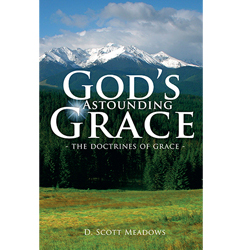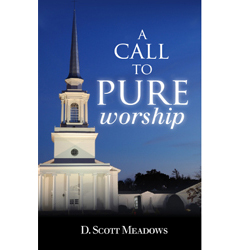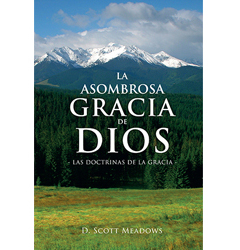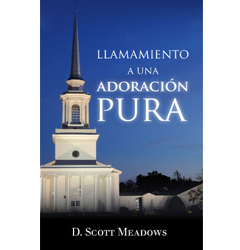
Our Comforting Hope
D. Scott Meadows
First-century Christians expected Christ’s return even within their lifetime, with survivors entering the full blessings of salvation. They worried with grave concern that brethren who had died may had missed out on those blessings. Like us, they desired to rejoice with their loved ones in eternity.
This anxiety was Paul’s clear pastoral concern for the dear Thessalonians (1 Thess 4:13-18). He acknowledges their uneasiness and addresses it by straightforward teaching about our future with Jesus, whether we die before He returns. Paul is not making a broad statement about all that shall happen on the Last Day, so he mentions nothing about the resurrection of the wicked and their eternal punishment. That did not fit his purpose in writing to this church.
My purpose now is broader than Paul’s. Comfort remains the supreme usefulness of this passage, but modern interpreters sometimes abuse it to support a popular teaching known as the “secret rapture.” Besides comforting you, I would expose that error even from this passage which one popular advocate calls “the biblical basis for ‘the Rapture’ of the church,” along with John 14:1-3 and 1 Corinthians 15:51, 52 (copied). None of these, nor all three taken together, nor any passage elsewhere in Scripture, support the secret rapture notion. That Christ will bring along with Him all true Christians, those still alive along with those who have died, when He returns, is and has been the common hope of Christ’s church, but the novel ideas that some professing Christians and all the unconverted will be “left behind” on earth for many years afterward, and that Christ’s return has multiple phases (before and after a 7-year tribulation period, for example) along with multiple resurrections of various groups, are of relatively recent vintage. Further, the body of Christ as a whole has never embraced these Dispensational inventions.
If you read the passage with Dispensational eyes, I urge you to take another look, resisting every temptation to eisegesis. Many earnest Bible students for 18 centuries saw no evidence of the currently popular novelties here, but only a confirmation and elaboration of the doctrine of the Lord’s return to save His chosen people asserted in many other passages of the Old and New Testaments. Sound interpretations of Scripture depend on seeing consistency of a passage under consideration with the immediate and larger biblical context. A traditional interpretation of 1 Thessalonians 4 harmonizes it with the rest of Scripture, while the Dispensational view tends to atomize passages, pitting them against each other.
Let us consider a verse-by-verse meditation upon the text.
- Have Hope for Your Deceased Brethren (v. 13)
The word “ignorant” (KJV) can sound demeaning to modern ears, but here it simply means not to know something. The Thessalonian believers were suffering anxiety because of a measure of doctrinal ignorance. This particular gap in their spiritual knowledge caused them to sorrow for their deceased brethren as unbelievers do in their bereavements, without hope. Paul’s spiritual antidote is not merely to express proper sympathy, but to teach them, theologically, why their special concern was unwarranted.
The reason they should not sorrow without hope is that their loved ones who died had not perished after all. They were merely “asleep” (euphemism for death, not “soul sleep”) until Christ returns, at which time they would be raised to glorious immortality and inherit the kingdom of God with all other believers.
This verse illustrates sound theology’s practical use for a Christian’s deep comfort. Remember the Heidelberg Catechism’s grand opening statement of the Christian’s “only comfort in life and in death”: it is gospel doctrine. An old Charlie Brown cartoon featured a conversation between Lucy and Linus. She remarked, “Boy, look at it rain. What if it floods the whole world?” He answers, “It will never do that. In the ninth chapter of Genesis, God promised Noah that would never happen again, and the sign of the promise is the rainbow.” She smiles and says, “You’ve taken a great load off my mind.” The punch line from Linus: “Sound theology has a way of doing that!” That is a memorable cartoon which amuses and edifies!
- Christ’s Resurrection Guarantees Theirs (v. 14)
“If” here means “as truly as” (SOED). The proposition is not in doubt. They were Christian believers, and this faith is universal among us. “Even so” strongly asserts the certainty of the second statement, that “God will bring, along with Jesus, those who sleep in Him” (deceased Christians). The sense is, “bring with Him” from the state of death, as Christ Himself was brought. This bodily resurrection of all deceased Christians will occur at “the coming of the Lord” (v. 15). Christ’s bodily resurrection is the guarantee and pattern of the resurrection of all deceased Christians when Christ returns. Like Christ, they have truly died. Like Christ, they will be raised and enjoy the full blessings of His eternal kingdom.
- Christians Dead or Alive Shall All Be Together (v. 15)
The first phrase strongly asserts the divine authority of what follows. While the whole epistle is divinely inspired and trustworthy, the apostle gives extra assurance for the blessed promise in this verse. It is a “mystery” in the sense that it is more fully revealed in its details here (cf. 1 Cor 15.51). The OT is not so explicit about the Last Day, that some of God’s elect will have died and be raised, while others will remain alive and be changed in a manner comparable to the resurrected saints. Namely, the bodies of both will be fully redeemed on that day and delivered from all miseries associated with this fallen world (Rom 8.23). Paul stresses that the living saints will not “prevent” (old sense of “to go before, to precede”) “them [Christians] which are asleep [dead]” (cf. Jn 11.11-14). The readers’ Christian loved ones will not miss out on anything, for they will be the first in line on that Day!
- The Lord Jesus Himself Will Return and Raise the Dead (v. 16)
This and the next verse answers the question of how such a thing can be, this final salvation of all Christ’s people, the deceased first to enjoy it. The answer is that Christ Himself is returning to earth personally, gloriously, and publicly. On that Day these blessed things shall all happen by the decree of the Almighty.
Advocates of the secret rapture attempt to argue for it from this verse. Allegedly, this is a distinct event from Christ’s second coming from heaven to earth only to occur years later. He will supposedly “appear” before He actually “returns,” “for His saints” rather than “with His saints,” to catch them away from the earth rather than giving them the New Creation (including the earth) for their eternal inheritance. All this is to pit biblical passages against each other rather than to harmonize them as describing the same event. If we accept the biblical teaching that Christ’s return is a single event rather than His returning in phases like this (partly to earth first, all the way to earth the second time—a virtual third coming), such fanciful notions appear specious.
The evidence against that Dispensational interpretation is plainly present in this very text. This “descent from heaven” is the same return promised to us in Acts 1.11—the reverse of His glorious Ascension from earth to heaven. Also, there is nothing secret about this rapture. Note how noisy it will be: with a shout, an archangel’s voice, and God’s trumpet! This comports with Jesus’ own description in other places (Matt 24.23-27) and John’s in the book of Revelation (Rev 6.15-17).
Besides, Christ’s return will be the great resurrection day when all who have died, both the righteous and the wicked, shall be raised at once according to the plainest testimonies of both the OT and the NT (Dan 12.2, 3; John 5.28, 29). Of multiple returns of Jesus Christ and separate days of resurrection for the righteous and the wicked, the Scriptures know nothing.
Thus, the traditional interpretation of this passage, held long before Dispensationalism arose in church history, takes these words in their plain and obvious sense, consistent with the Bible’s teachings elsewhere on this topic.
- The Lord Will Also Gather the Surviving Saints (v. 17)
“Then” suggests at that very time when the Lord returns, as described in verse 16, with no delay between them. On the day the Lord Himself descends from heaven, the dead in Christ shall rise first, that is, before “we which are alive and remain” rise to be with the Lord. But immediately, upon the heels of deceased Christians made immortal, we who happen still to be alive on that Last Day, “together with them” (alt., “simul,” at once, Vulgate), (“them,” i.e., the resurrected saints), shall be “caught up” (basis of the English word “rapture,” lit., “seized” or “snatched away,” like a hawk carrying aloft prey from the ground). “In the clouds” likely refers to “clouds” of glory around the Lord Jesus, not weather clouds. In this way we will “meet the Lord [Jesus] in the air,” saved from fiery ruin of the old heavens and the old earth, and preserved for the blessed life in the New Creation, “and so shall we ever be with the Lord” Jesus Christ (cf. John 14.3).
- Comfort One Another with this Blessed Hope (v. 18)
The vision portrayed in these parting words on the subject is one of the whole number of God’s elect, Christ’s redeemed Church, completely delivered from all our enemies—sin, death, Satan, and hell—and rejoicing in Christ’s immediate presence by His gracious power in the New Creation also redeemed eternally from the curse. Sinless souls in deathless bodies inhabiting the consummated Paradise planned from eternity in the loving favor of our God, Him dwelling with us and in us, and us dwelling with Him and in Him, a blessed union incomprehensible in its glorious bliss! This is the Christian hope, assured to us by God’s holy Word, and the basis for our comfort while temporarily mourning loved ones who have died in the Lord. And what a comforting hope it is! And we have every reason to expect it soon, perhaps even in our lifetime. May God grant that this passage from 1 Thessalonians 4 will help us to look up with eagerness, for our redemption draws nigh! Amen. Ω
All Rights Reserved. Used with permission. No part of this article may be used or reproduced in any manner whatsoever or translated without written permission.
The following books by D. Scott Meadows are available at Trinity Book Service and Cristianismo Histórico:
Ebook: A Call to Pure Worship | D. Scott Meadows





